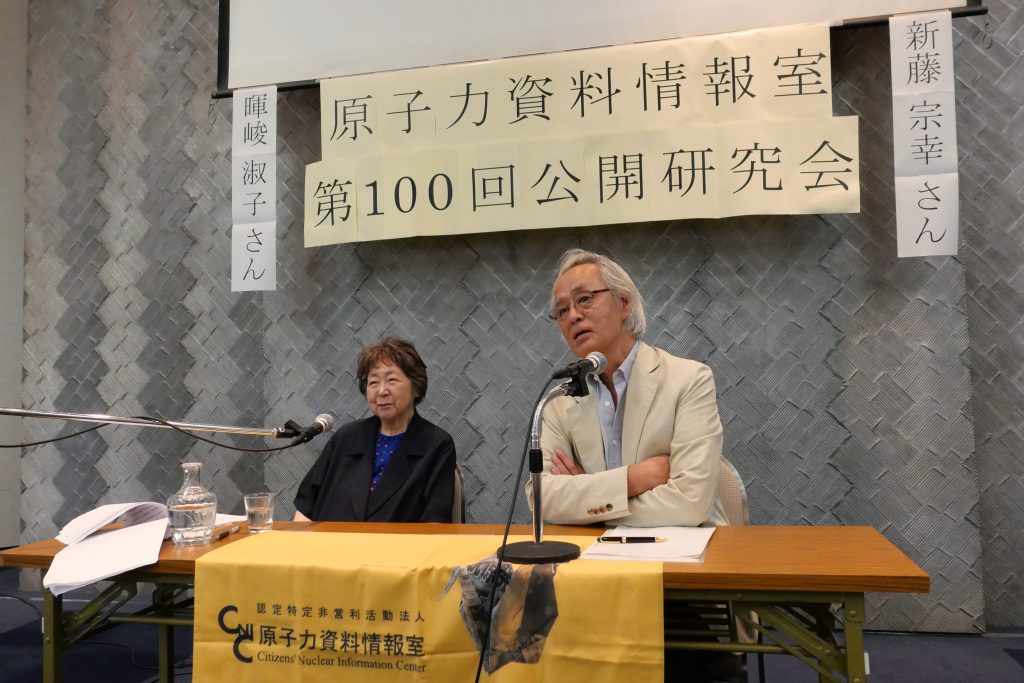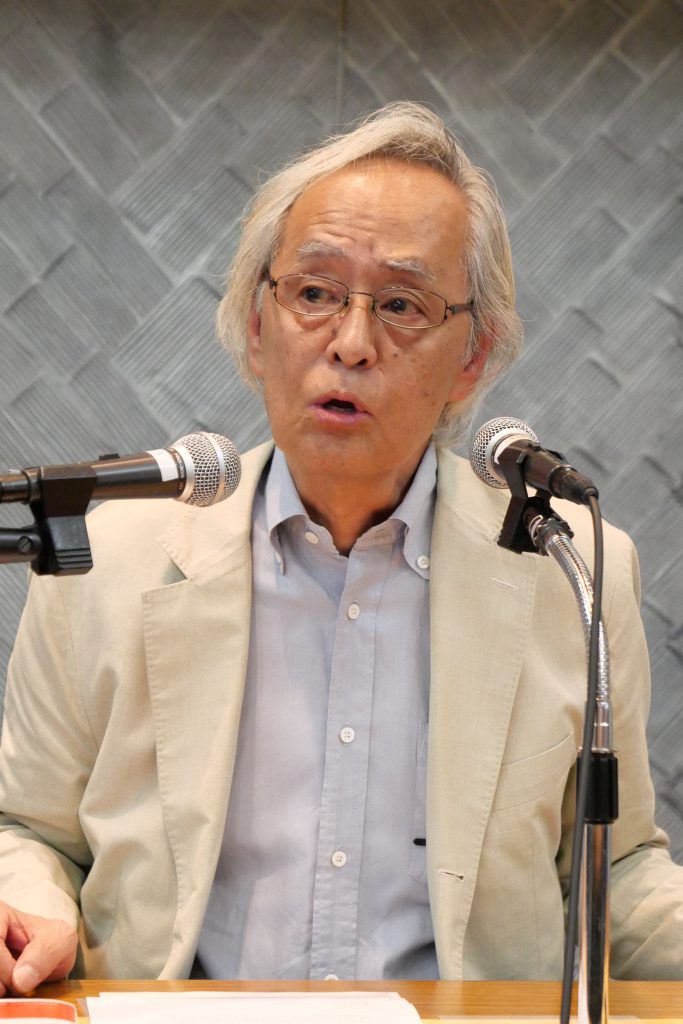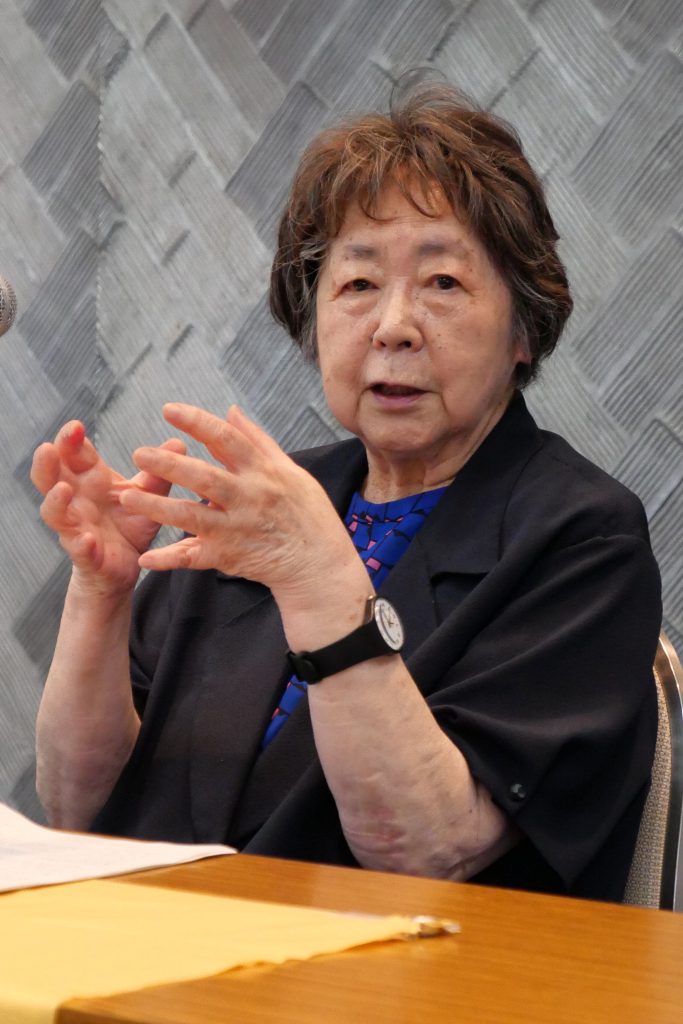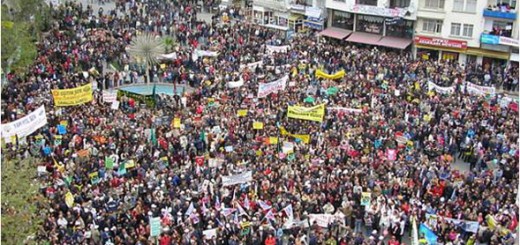Imagining a nuclear-free society
Report on the 100th Public Seminar of the Citizens’ Nuclear Information Centre
By Kataoka Ryohei

CNIC’s 100th Public Seminar was held on June 23, 2019 at the Korean YMCA in Japan Asia Youth Center. Going nuke-free can already be called inevitable, but how should Japan’s bureaucracy, which has existed for nearly a century and half since the Meiji era, be reformed? Also, what would a truly affluent sustainable society be like? We had Shindo Muneyuki (professor emeritus, Chiba University) and Teruoka Itsuko (professor emeritus, Saitama University) give us their ideas.
1. Prof. Shindo Muneyuki: ‘A Nuclear-free society and political-governmental structural reform’
What is a ‘nuclear-free society?

In direct terms, a “nuclear-free society” is one from which nuclear power and the technological and economic systems associated with it have disappeared. However, even though Japan became thoroughly acquainted with the consequences of war in its 1945 defeat, it says it will go ahead again and purchase an aircraft carrier and F-35 fighter jets. Even if all of its nuclear power plants were to be shut down, that would not result in a nuclear-free society. For example, it might still produce technological and military systems for space warfare.
Even assuming the nuclear power plants disappeared, our way of thinking as a social system would probably remain the same. A nuclear-powered society is a metaphor for faith in megatechnics and modernization. A nuclear-free society would be the polar opposite of that, switching from megatechnics to appropriate technology and producing a social framework with an economic society and lifestyle in which human activity is valued. But this is quite a difficult task.
A society that regards appropriate technology and human dignity as important cannot be explained without mentioning how it would confront the problems of political democracy. At the heart of modern political administrations is the structure known as bureaucracy. How to reform a bureaucracy for a nuclear-free society is an important theme.
Bureaucracy as the best-matched system for modernization
It has been in the modern age that the organizational form known as bureaucracy has become a problem. German sociologist Max Weber said that bureaucracy as a type of governance constitutes the most rational-legal way in which human activity can be organized. It excels at rational-legal governance in that it makes the actions of authorities predictable to outsiders on the basis of various social criteria such as laws. However, it organizes systems of authority and responsibility into a pyramid form with impersonal constituent members. Because of this impersonality, it works extremely mechanically and efficiently.
Japan’s bureaucracy and politics
In Japan, a cabinet government system was established in 1885, replacing the “Dajokan (Grand Council of State)” system that had been established earlier in the Meiji era, and in the latter half of the 1880s, a bureaucratic structure was created. This bureaucratic structure, however, was not a part of the national government. It was created to serve the Emperor under imperial sovereignty. A variety of aspects of this system came to light in the 70 years of its duration before and after the war. This bureaucracy had the following three essential characteristics.
The ethos (mentality) of putting officials first
Under the pre-war imperial government, it was said that the citizens were subjects of the Emperor and called sekishi (literally, “babies”), while the officials were the Emperor’s servants, thus their interests came first. The officials performed their work by borrowing authority from the Emperor, who was the sovereign. The people could not intervene. Even now, if Japan’s governmental organizations make any kind of error, they never talk about responsibility for it. Officials are infallible so the people must be at fault. This is the ethos of official infallibility.
Status issues of the bureaucracy or legal public official system
The pre-war bureaucracy was divided into three categories: high-level officials, common officials and subordinate officials, or “employees.” In addition, status relationships were systematized in accordance with distance from the Emperor. The term for the subordinate officials, “zoku,” was derived from “fuzoku (accessories),” a demeaning term. When the current Public Officials Law was enacted in 1947, this status system was abolished. The employment examination for civil servants, however, categorizes those taking it on the assumption of their potential for advancement. Six years ago, the National Public Service Examination was divided into comprehensive and general-duties courses. The former had been known long before as the “elite course,” and the latter course has limited possibilities, providing no chance of advancing beyond section chief in a local bureau regardless of efforts. The status relationship that existed in the pre-war bureaucratic system continues essentially as before.
Unclear authority and responsibilities of governmental organizations
The legislation establishing each of the ministries, including the cabinet ordinances and ministry ordinances based on them, lists the scope of affairs under the jurisdiction of each ministry, bureau and section. Almost all are written as “affairs regarding XX,” which is easy to understand in any case. However, regarding the ministers, vice-ministers, bureau directors, section chiefs and other positions, nothing is written about their responsibilities or authority. Those are left unclear.
Another problem is the relationship between the administrative function laws and the National Government Organization Act. The administrative function laws provide the basic criteria for the exercise of public authority. In the case of violating the speed limit under the Road Traffic Act, for example, the criterion for exercising authority is an “administrative function law.”
The National Government Organization Act governs the establishment and scope of affairs under the jurisdiction of governmental organizations. By nature, there is supposed to be an anaphoric relationship between the National Government Organization Act and the administrative function laws, with the latter referring back to the former, but under the imperial government there was no need for that. Even after the war, though, the relationship between them was left unexamined. Therefore, these days it is still possible for officials to exercise authority on the basis of nothing more than the National Government Organization Act’s regulations on the scope of affairs under their jurisdiction. This way of running affairs gives government agencies unlimited authority. If there are no legal standards for exercising authority and authority can be exercised on the basis of regulations on the scope of affairs under the jurisdiction of governmental organizations alone, authority expands without limit. This is why Japan’s bureaucracy has amplified its authority beyond comparison with those of other advanced countries. This kind of abuse is also seen in nuclear power policies.
The ‘Kantei’ Leadership System and Bureaucracy
From the late 1980s to the early 1990s, one political scandal after another came to light in Japan. In response to that, a single-seat constituency system was introduced to the House of Representatives as a political reform. In addition, the Parties Subsidies Act was passed for distributing subsidies in accordance with the number of Diet members each political party had. Under the system implemented by this and other legislation, the central authority within political parties has become stronger. That political reform persists to this day, with the prime minister becoming more powerful. Furthermore, under the Abe administration, the Cabinet Secretariat and Cabinet Office have hypertrophied to the extent that Prime Minister Abe has created a veritable mini-Kasumigaseki (the district in Tokyo where most of Japan’s government ministry offices are located) of his own. This has resulted in coining of the terms “Kantei leadership” and “Kantei bureaucracy,” Kantei being the Prime Minister’s residence.
What should be reformed in what way—in line with bureaucracy
I offer the following in answer to the question of what should be done.
- Abolish the Cabinet Office and refine the authority of the Cabinet Personal Affairs Bureau through political appointments.
- Create a system capable of forming ministries and government offices flexibly.
- Switch from a faceless form of control to a bureaucracy with identifiable people in charge.
These, I think, would be sole basic conditions for designing and implementing policies that presuppose appropriate technology and human common sense and rationality. Doing these will not result in a nuclear-free society, but in my view they would result in a more decent form of politics than at present, allowing progress to be made.
2. Prof. Teruoka Itsuko: ‘Would becoming a nuclear-free society be enough?’
From a common-sense perspective, nuclear power is a vanishing industry

From an economics viewpoint, nuclear power is preposterous, though the biggest problem is that there are no disposal sites for nuclear waste.
What I am most concerned about, however, is that nuclear energy may be used for military purposes. Costs are never considered in military affairs. The economic costs have been brought up as a reason to abandon nuclear power, but if the military becomes the reason for maintaining nuclear power plants the problem will have to be attacked from a different logical angle from before. Thus I feel that amending Article 9 of the Constitution would be wrong from the perspective of nuclear power as well.
Would the advent of a nuclear-free society resolve the issues?
As the late Dr. Jinzaburo Takagi said, Japan accepted nuclear power because democracy has no roots here. With only a façade of democracy, what might befall Japan after nuclear power? Even the Fukushima nuclear accident failed to bring about the abandonment of nuclear power—that is how really weak democracy is in Japan. Even if nuclear power were to cease to exist, the thought of whether Japan’s democracy would have what it takes to reject the next thing like that to come along terrifies me.
When Germany learned of the Fukushima nuclear accident, about 250,000 people demonstrated across Germany for abolition of nuclear power. Right away, Chancellor Merkel promised to abandon nuclear power. A strong will exists with the realization that this is absolutely no good for our descendants. Generally, Japanese people seem to lack the backbone for it, and it really worries me whether we can manage to become a nuclear-free society this way.
Jinzaburo Takagi’s ‘Crisis Science’
In his book, Kiki no Kagaku (Crisis Science), Takagi said, “The weakness that allowed nuclear power in the door was that no dialog was being conducted in a democratic manner between Japan’s politicians and citizens. Dialog was also lacking between nuclear power experts and citizens and among the experts themselves.”
It was not as if there were no dialog at all between citizens and experts. It was just that their numbers were small so they had little impact. When told a plausible lie by nuclear power proponents, the Japanese are swayed by it.
Toward a society that engages in dialog
I don’t think there is anyone who thinks dialog is bad, but dialog is disappearing from Japanese society. “Liking” someone on your smartphone is not dialog.
Generally, about 80 percent of errors are human errors, and Takagi also noted, “Human error cannot be eliminated. Therefore it is impossible to call nuclear power plants safe.” In airline companies, the pilots, cabin crew and repair workers chat together when they are on standby, and the talk turns to the various ways problem can occur, saying “this thing happened, and then that thing happened,” and the result is reduced human error. Errors are only reduced by human-to-human dialog. When I told a nurse about this, she said, “It is the same in the world of nursing.” When nurses talk to each other about various things, she said, errors decrease.
Why dialog is important
One reason is that when a child is born, the adults around him or her speak earnestly to the child. The parents believe the child is a living being that will respond. They speak to the child regardless of whether he or she understands or not. By hearing adults say things repeatedly, the child comes to perceive sounds as words. Therefore, if there is no dialog, the child does not learn words. Because they have the ability to respond through words, children can be educated.
A second reason is that dialog as a word stands for democracy. A democratic society, with the dignity of individuals as its starting point, is exactly the same thing as starting from dialog. Therefore, within a democracy the most important thing is not speeches by politicians.
What is important in dialog is not to use it as an exchange of words for the purpose of determining who wins and who loses. Also, turns should be taken speaking and listening. In dialog, the main thing is not to speak, but to listen. Therefore, if the government or politicians would like a dialog, they must listen to what the citizens are saying.
When they are engaging in dialog, new ideas will arise. That both parties discover this is the innermost secret of dialog. Japan has come to do everything expeditiously, catching up and overtaking others, so it has abandoned this important thing we call dialog. If we would like to renew our society now, though, we must restore that which we abandoned.
- For a video of the 100th Public Seminar (in Japanese), see: www.cnic.jp/movies/8565

